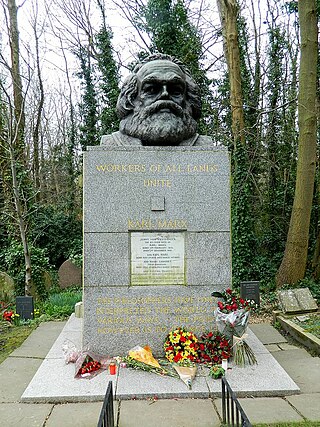The Socialist Campaign Group, also simply known as the Campaign Group, is a UK parliamentary caucus of the Labour Party including Members of Parliament in the House of Commons. The group also includes some MPs who formerly represented Labour in Parliament but have had the whip withdrawn or been expelled from the party.
The soft left, also known as the open left, inside left and historically as the Tribunite left, is a faction within the British Labour Party. The term "soft left" was coined to distinguish the mainstream left, represented by former leader Michael Foot, from the hard left, represented by Tony Benn. People belonging to the soft left may be called soft leftists or Tribunites.

Eric Samuel Heffer was a British socialist politician. He was Labour Member of Parliament for Liverpool Walton from 1964 until his death. Due to his experience as a professional joiner, he made a speciality of the construction industry and its employment practices, but was also concerned with trade union issues in general. He changed his view on the European Common Market from being an outspoken supporter to an outspoken opponent, and served a brief period in government in the mid-1970s. His later career was dominated by his contribution to debates within the Labour Party and he defended the Liverpool City Council.
The International Revolutionary Marxist Tendency was an international Marxist group based in France led by Michel Pablo, also known as Michael Raptis, the former secretary of the Trotskyist Fourth International. It resulted as a regroupment of activists expelled from the Fourth International over their opposition to the 1962 re-unification process with the so-called "International Committee of the Fourth International"(ICFI) which had split from the Fourth International in 1953 over the question of entrism sui generis, a form of entryism which involved eschewing overt organisation building efforts in favour of long term participation in social democratic and communist parties. The re-unification process was rushed while Pablo was imprisoned in the Netherlands for illegal activities in support of the Algerian revolution.
The Socialist Society was founded in 1981 by a group of British socialists, including Raymond Williams and Ralph Miliband, who founded it as an organisation devoted to socialist education and research, linking the left of the British Labour Party with socialists outside it. The Society grew out of the New Left Review (NLR) and many of its active members were involved in the NLR: Robin Blackburn, Tariq Ali, Michèle Barrett, Michael Rustin and Hilary Wainwright. Other active and prominent members of the Society included Richard Kuper, John Palmer, John Williams and Barney Dickson. The Society published a magazine and a series of pamphlets.
The 1988 Labour Party leadership election saw Tony Benn, identified with the left wing of the British Labour Party, challenge the incumbent leader Neil Kinnock identified with the more moderate social democratic wing.

SirKeir Rodney Starmer is a British politician and barrister who has served as Prime Minister of the United Kingdom since 2024 and as Leader of the Labour Party since 2020. Previously Leader of HM Opposition from 2020 to 2024, he has represented Holborn and St Pancras as its Member of Parliament (MP) since 2015, having previously been Director of Public Prosecutions from 2008 to 2013.
The Labour Party Young Socialists (LPYS) was the youth section of the Labour Party in Britain from 1965 until 1991. In the 1980s, it had around 600 branches, 2,000 delegates at its national conferences and published a monthly newspaper, Left, later Socialist Youth. From the early 1970s, it was led by members of Militant.
The International Marxist Group (IMG) was a Trotskyist group in Britain between 1968 and 1982. It was the British Section of the Fourth International. It had around 1,000 members and supporters in the late 1970s. In 1980, it had 682 members; by 1982, when it changed its name to the Socialist League, membership had fallen to 534.

Socialism in the United Kingdom is thought to stretch back to the 19th century from roots arising in the English Civil War. Notions of socialism in Great Britain have taken many different forms from the utopian philanthropism of Robert Owen through to the reformist electoral project enshrined in the Labour Party that was founded in 1900 and nationalised a fifth of the British economy in the late 1940s.
Michel Pablo was the pseudonym of Michalis N. Raptis, a Trotskyist leader of Greek origin.
The Militant tendency, or Militant, was a Trotskyist group in the British Labour Party, organised around the Militant newspaper, which launched in 1964.
The Revolutionary Communist Party was a British Trotskyist group, formed in 1944 and active until 1949, which published the newspaper Socialist Appeal and a theoretical journal, Workers International News. The party was the ancestor of the three main currents of British Trotskyism: Gerry Healy's Workers Revolutionary Party, Ted Grant's Militant and Tony Cliff's Socialist Workers Party.

Edward Grant was a South African Trotskyist who spent most of his adult life in Britain. He was a founding member of the group Militant and later Socialist Appeal.

Far-left politics in the United Kingdom have existed since at least the 1840s, with the formation of various organisations following ideologies such as Marxism, revolutionary socialism, communism, anarchism and syndicalism.
Simon Fletcher is a prominent figure on the left of the British Labour Party. He is a left wing political strategist and campaigner who has held senior positions working for socialist politicians including the Mayor of London Ken Livingstone and leader of the opposition, Jeremy Corbyn.




